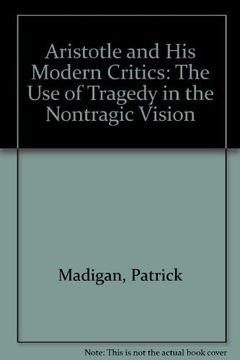Aristotle and his Modern Critics: The use of Tragedy in the Nontragic Vision (en Inglés)
Reseña del libro "Aristotle and his Modern Critics: The use of Tragedy in the Nontragic Vision (en Inglés)"
Aristotle's analysis of tragedy has traditionally been criticized for being overly terse and frustratingly ambiguous. Recently, however, in the wake of Nietzsche's radical psychology, a more serious charge has been lodged: that Aristotle, like Plato, could not stand to face the irrational view of the universe that is the chief source of the fascination, power, and attraction that tragedy has traditionally exercised over its audience. The philosophy of Plato and Aristotle began as a backlash against the "blasphemous theology," as Ricoeur calls it, which tragedy forces insistently to our attention. While granting a hesitancy in Aristotle in dealing with this crucial issue, this study locates the reason for this reluctance not in a failure of nerve before the tragic vision, but rather in the embarrassment Aristotle felt at the failure of his system to measure up to his program of explanation. Once this embarrassment is removed (as in an expansion of the canons of divine perfection), surprising resources can be discovered within Aristotle's works to account for the utility of the tragic experience in allowing the individual to move, philosophically, toward a nontragic worldview. From this perspective, philosophy would build upon and become an extension of tragedy rather than being a compulsive backlash against it. Reciprocally, tragedy would not remain excluded as a scandal to the philosophic worldview, but would be eagerly enlisted by philosophy as an unexpected and useful stimulant for prodding the individual to the highest levels of intellectual attainment.Important chapters in this work also discuss comedy and tragedy in general terms, by no means strictly tied to Aristotle but claiming very broad applicability. The author draws substantially on an examination and testing of Aristotle's metaphysical outlook in relation to the phenomenon of tragedy. This suggests that frankly facing the tragic outlook of the human situation may be an emotional impetus and may provide imagistic resources to enable us to achieve a contemplative understanding of the human condition as not ultimately tragic--a conclusion that can ony be validated as "knowledge" insofar as it had dialectically confronted its most serious challenge, namely, the tragic vision. Thus, this book is directed to modern (post-Nietzschean) ways of thinking, which insist that the tragic vision alone is the truth of the human condition and that the audience's ability to properly appreciate tragedy depends upon its willingness to accept its "blasphemous theology" as our ultimate truth.This work is lucid, arresting, and accessible in style, completely free of the jargon of any school, and its thesis is highly relevant to many areas of contemporary thought. This book should make a useful contribution to a variety of courses in literature and philosophy.

